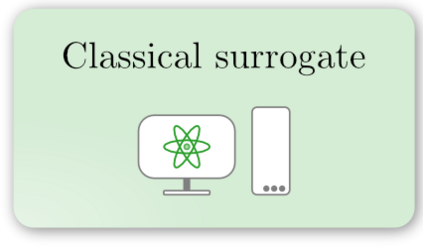The advent of noisy intermediate-scale quantum computers has put the search for possible applications to the forefront of quantum information science. One area where hopes for an advantage through near-term quantum computers are high is quantum machine learning, where variational quantum learning models based on parametrized quantum circuits are discussed. In this work, we introduce the concept of a classical surrogate, a classical model which can be efficiently obtained from a trained quantum learning model and reproduces its input-output relations. As inference can be performed classically, the existence of a classical surrogate greatly enhances the applicability of a quantum learning strategy. However, the classical surrogate also challenges possible advantages of quantum schemes. As it is possible to directly optimize the ansatz of the classical surrogate, they create a natural benchmark the quantum model has to outperform. We show that large classes of well-analyzed re-uploading models have a classical surrogate. We conducted numerical experiments and found that these quantum models show no advantage in performance or trainability in the problems we analyze. This leaves only generalization capability as possible point of quantum advantage and emphasizes the dire need for a better understanding of inductive biases of quantum learning models.
翻译:噪音的中间级量子计算机的出现使得可能应用的搜索成为量子信息科学的最前沿。希望通过近期量子计算机获得优势的领域之一是量子机器学习,讨论基于超美化量子电路的变异量子学习模型。在这项工作中,我们引入了古典代代谢模型的概念,这是一种古典模型,可以从经过训练的量子学习模型中有效获得,并复制其输入输出关系。典型的替代模型可以典型地进行,其存在极大地增强了量子学习战略的可适用性。然而,古典代代谢也挑战量子计划的可能优势。由于可以直接优化古典代孕替代模型的炭酸盐,因此它们创造了量子模型的自然基准。我们表明,大量分析精良的再加装模型有一个典型的代孕模型。我们进行了数字实验,发现这些量子模型在我们分析的问题中的性能或可训练性方面没有优势。这只留下一般化能力,作为可能的量子优势点,并且强调在更好理解量质子学习的极端需要。






